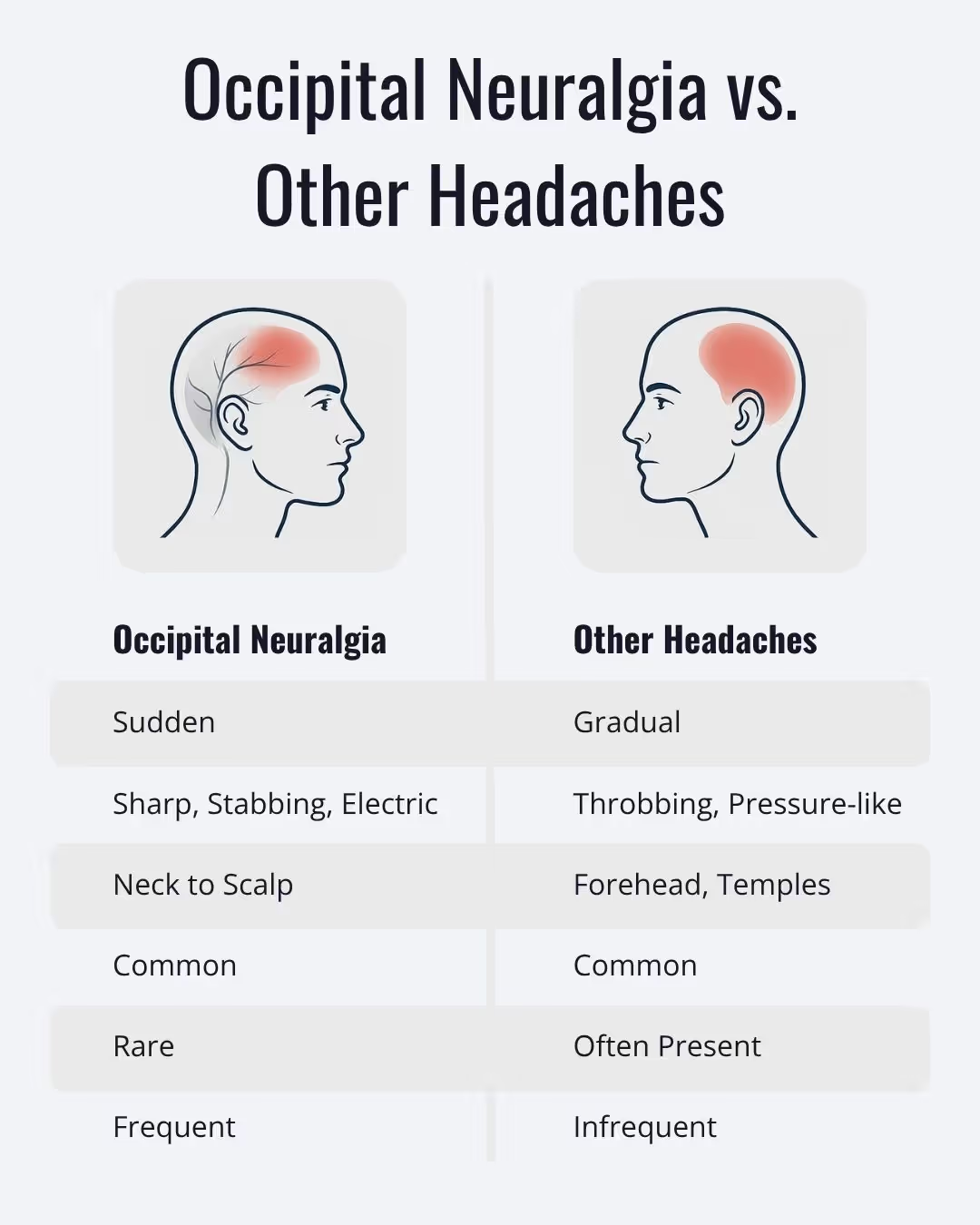Pain that starts near the neck and spreads across the back of the head can leave you searching for answers. It may feel sharp, burning, or deep, and it can make simple movements or rest difficult.

When this kind of pain follows a car accident, fall, or other injury, it may be linked to a nerve damage called occipital neuralgia.
To learn exactly what causes occipital neuralgia and why this condition can appear after head or neck trauma, keep reading.
Thorsnes Bartolotta McGuire has spent 47 years representing individuals who have been injured across California. We've secured over $2 billion in verdicts and settlements for clients harmed by negligence.
If your head or neck pain began after an accident, we can help you find answers and pursue the compensation you deserve. Call (619) 236-9363 or message us to schedule a free case review.
What Triggers Occipital Neuralgia?
Occipital neuralgia occurs when the nerves that connect the upper spine to the scalp are injured or compressed. These nerves carry sensation through the back of the head, and when they are strained, they can cause pain that differs from an ordinary headache.
The most common occipital neuralgia causes involve injuries such as:
- Whiplash. A sudden back-and-forth motion of the head can stretch or tear soft tissue in the neck. This often occurs in car crashes and can put pressure on the occipital nerves.
- Direct impact to the head. Blunt force trauma, such as striking the back of your head during a fall or sports accident, can injure the nerves or cause swelling that presses against them.
- Concussion. Even when mild, the movement of the brain inside the skull can irritate the occipital nerves. Pain may appear days or weeks later as nearby muscles tighten.
- Neck or cervical spine trauma. Damage to the upper vertebrae can compress the occipital nerves where they exit the spine. These injuries may come from car accidents, falls, or other sudden impacts.
- Prior surgery. Procedures involving the neck or the back of the head can sometimes lead to nerve irritation or scar tissue that presses against the nerves, causing discomfort.
While both men and women can develop occipital neuralgia, research shows it is diagnosed more often in women. Studies suggest a general female predisposition to this condition, which may be set off or made worse by neck and head injuries such as whiplash.
How Do I Know If I Have Occipital Neuralgia?
Occipital neuralgia is sometimes mistaken for tension headaches or migraines, but the pain usually begins suddenly rather than building gradually.
Many describe it as stabbing, shooting, or electric. For others, it feels like a deep ache that settles across the scalp.
The discomfort may appear on one side of the head or on both sides, depending on which nerves are involved. And while sensitivity to light is common, nausea and vomiting are rare.
Signs and symptoms of occipital neuralgia include:
- Sharp or throbbing pain that radiates from the neck to the back of the head;
- Tenderness or sensitivity where the neck meets the skull;
- Pain behind one eye or around the temples;
- Scalp soreness, making it painful to brush your hair, rest your head, or wear a hat;
- Numbness or tingling in the scalp; and
- Increased pain with neck movement.
If these symptoms began in the weeks or months following a car crash, a fall, or another impact, they may signal that the occipital nerves were damaged in that injury.

Can Occipital Neuralgia Cause Vision Problems or Dizziness?
Because the occipital nerves interact closely with other sensory pathways, they can affect vision and balance when irritated or compressed after an accident.
Vision problems you may experience with an occipital neuralgia include:
- Blurry vision,
- Sensitivity to light (photophobia), or
- Pressure or pain behind the eye.
In some cases, intense pain can lead to temporary vision loss or areas of shadowed vision.
Damage to the occipital nerves can also affect balance and movement, leading to:
- Dizziness,
- A sense of spinning or unsteadiness, or
- Vertigo, where the surroundings feel like they're moving or tilting even when still.
While these problems can be alarming, they don't always indicate direct damage to the eyes or inner ear. They usually result from nerve pain, muscle strain, or inflammation in the surrounding area.
When signs and symptoms of occipital neuralgia appear after an accident, it can be difficult to know what to do next. Thorsnes Bartolotta McGuire helps clients seek answers and compensation from those responsible for their injuries.
Contact us at (619) 236-9363 for a no-cost consultation with an attorney experienced in head and neck injury cases.
Are There Other Complications Associated With Occipital Neuralgia?
When occipital neuralgia remains untreated or becomes chronic, it can alter a person's ability to move, sleep, and interact with others.
Chronic Pain
- Worsening pain. What starts as short, stabbing shocks can turn into a chronic, throbbing ache that never fully fades. The pain may spread across the scalp or neck, making it harder to work, rest, or focus.
- Medication overuse. Reaching for pain relievers every few hours can seem like the only way to get through the day. Over time, this can dull their effect, cause new headaches, or lead to dependence.
- Muscle fatigue and spasms. Keeping the neck and shoulders tense in anticipation of pain can lead to stiffness, cramping, and soreness, making movement more difficult.
- Decreased mobility. Avoiding activity to prevent flare-ups can weaken muscles and tighten joints, limiting flexibility and comfort.
Mental and Emotional Health
- Anxiety and depression. Constant pain can make even simple decisions or social plans feel exhausting. Many people describe feeling trapped in a cycle of pain and worry that's hard to escape.
- Cognitive difficulties. Long-term discomfort can blur concentration and memory, leading to moments where it's difficult to think clearly or stay organized.
- Increased risk of suicide. When pain persists, it can impact a person's perception of the future. Ongoing emotional support and mental health care are crucial.
Sleep Deprivation
- Insomnia. Pain can interrupt rest throughout the night, leaving you drained and irritable by morning.
- Heightened pain sensitivity. Poor sleep makes the body less able to regulate pain, so discomfort feels sharper and recovery takes longer.
Reduced Quality of Life
- Social withdrawal. The fear of another flare-up can cause people to decline invitations or withdraw from friends and family.
- Impact on relationships and work. Fatigue and mood changes can create tension, while headaches and distraction interfere with home life, job performance, or career progress.
Occipital neuralgia after an accident can lead to months of medical care, therapy, and time away from work. When the cause ties to another person's negligence, legal action may be an option.
When Someone Else Is Responsible
Head or neck trauma that leads to occipital neuralgia can affect how you work, rest, and manage daily tasks.
When this kind of injury stems from another person's carelessness, you may have the right to seek compensation through a personal injury lawsuit. These claims may involve:
- A reckless driver causes a collision that injures the head or neck;
- Property owners fail to correct unsafe conditions that lead to a fall;
- A sports impact or practice accident results in nerve damage;
- A surgeon makes an avoidable error; or
- A defective product or piece of equipment contributes to injury.
Compensation may cover medical expenses, physical therapy, and lost income. If you suspect that someone's negligence caused your condition, speaking with an attorney can help you understand your rights and what steps to take next.
Speak With Thorsnes Bartolotta McGuire About Your Occipital Neuralgia
Occipital neuralgia after an accident can take months to improve. During that time, medical bills accumulate, work becomes difficult or impossible, and the pain can limit activities like driving, sleeping, or caring for your family.
If your condition resulted from someone else's actions in a collision, fall, or other accident, you may be entitled to compensation that covers treatment, income loss, and the disruption to your daily life.
Our San Diego law firm has represented injury victims for nearly fifty years, recovering over $2 billion in verdicts and settlements. Call (619) 236-9363 or contact us online for a free consultation.






